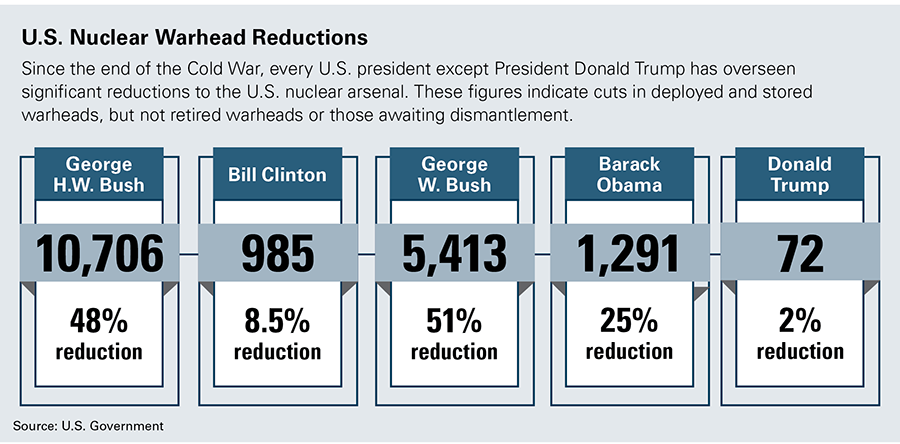“For 50 years, the Arms Control Association has educated citizens around the world to help create broad support for U.S.-led arms control and nonproliferation achievements.”
U.S. Discloses Nuclear Stockpile Numbers
November 2021
By Shannon Bugos
The Biden administration has publicly released the total number of nuclear weapons in the U.S. stockpile, a sharp reversal of the previous administration’s refusal to do so for the past three years.
“Today, as an act of good faith and a tangible, public demonstration of the U.S. commitment to transparency, we will present data which documents our own record of continued progress toward the achievement of the goals” of the 1968 nuclear Nonproliferation Treaty (NPT), said Bonnie Jenkins, undersecretary of state for arms control and international security, on Oct. 5.
The U.S. stockpile of nuclear warheads was at 3,750 as of September 2020, according to the administration document. This number captures active and inactive warheads, but not the roughly 2,000 retired warheads awaiting dismantlement. The document lists stockpile numbers going back to 1962, including the warhead numbers from the years when the Trump administration refused to declassify the information.
“This number represents an approximate 88 percent reduction in the stockpile from its maximum (31,255) at the end of fiscal year 1967, and an approximate 83 percent reduction from its level (22,217) when the Berlin Wall fell in late 1989,” the document said.
Despite a significant overall reduction, the updated figures show the scale of reductions to the stockpile has diminished in recent years and even reflect a 20 warhead increase between September 2018 and September 2019 under the Trump administration.
The Biden administration also disclosed how many nuclear warheads the Energy Department has dismantled each year since 1994, for a total of 11,683. The Obama administration decided in 2010, for the first time, to release the entire history of the size of the U.S. nuclear weapons stockpile. The Trump administration declassified the stockpile data for 2017, but did not do so again for the following years.
On Oct. 6, Rose Gottemoeller, chief U.S. negotiator for the 2010 New Strategic Arms Reduction Treaty, praised the Biden moves, saying that “such transparency measures are going to be crucial for future nuclear arms reductions.” But Sen. Jim Risch (R-Idaho), ranking member on the Senate Foreign Relations Committee, lambasted the decision in an Oct. 5 statement: “China and Russia failed to reciprocate any transparency when the United States did this during the Obama era, and instead embarked on major, opaque expansions and modernizations of their nuclear forces.”
